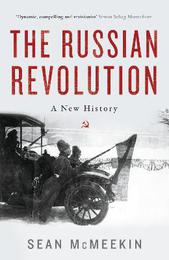
|
The Russian Revolution: A New History
Paperback / softback
Main Details
| Title |
The Russian Revolution: A New History
|
| Authors and Contributors |
By (author) Sean McMeekin
|
| Physical Properties |
| Format:Paperback / softback | | Pages:496 | | Dimensions(mm): Height 196,Width 130 |
|
| ISBN/Barcode |
9781781259030
|
| Classifications | Dewey:947.0841 |
|---|
| Audience | |
|---|
| Edition |
Main
|
| Illustrations |
16 page black and white photo plate section
|
|
Publishing Details |
| Publisher |
Profile Books Ltd
|
| Imprint |
Profile Books Ltd
|
| Publication Date |
3 May 2018 |
| Publication Country |
United Kingdom
|
Description
At the turn of the century, the Russian economy was growing by about 10% annually and its population had reached 150 million. By 1920 the country was in desperate financial straits and more than 20 million Russians had died. And by 1950, a third of the globe had embraced communism. The triumph of Communism sets a profound puzzle. How did the Bolsheviks win power and then cling to it amid the chaos they had created? Traditional histories remain a captive to Marxist ideas about class struggle. Analysing never before used files from the Tsarist military archives, McMeekin argues that war is the answer. The revolutionaries were aided at nearly every step by Germany, Sweden, and Switzerland who sought to benefit - politically and economically - from the changes overtaking the country. To make sense of Russia's careening path the essential question is not Lenin's "who, whom?", but who benefits?
Author Biography
Sean McMeekin is Professor of History at Bard College, New York. For some years he taught at Bilkent University, Istanbul. His books include the highly successful The Berlin-Baghdad Express (Penguin), The Russian Origins of the First World War and July 1914 (Icon).
ReviewsPraise for July 1914: 'Sean McMeekin's chronicle of these weeks in July 1914: Countdown to War is almost impossible to put down ... [McMeekin] delivers a punchy and riveting narrative of high politics and diplomacy over the five weeks after Sarajevo, more or less day by day, dwelling on small groups of decision-makers in and between the various capitals, and their interactions, by turns measured, perplexed, cordial, artful, angry, even tearful * New York Review of Books *
|